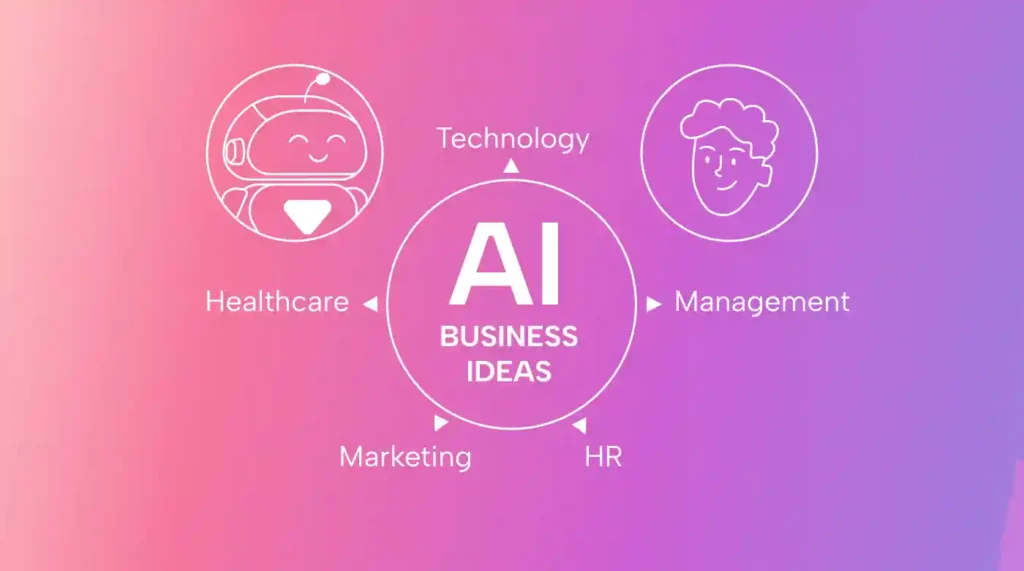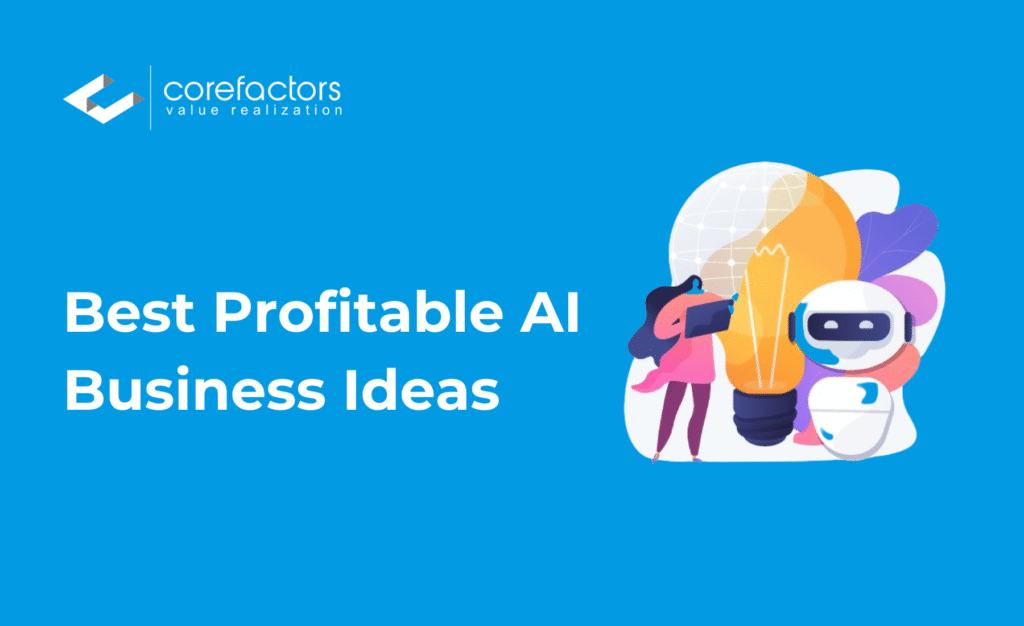Artificial Intelligence (AI) is transforming industries, creating a wealth of opportunities for entrepreneurs. The global AI market is projected to grow significantly, offering innovative business ideas for startups and established companies alike.
This blog explores the most profitable AI business opportunities, low-investment startups, industry-specific solutions, no-code AI product development, monetization strategies, and how to overcome challenges in AI business development. Let’s dive into the top AI business ideas for 2025.
Most Profitable AI Business Opportunities Today

AI is driving efficiency and innovation across sectors. Here are some of the most lucrative AI business ideas for entrepreneurs:
1. AI-Powered Virtual Assistants for Small Businesses
Small businesses often lack the resources for full-time staff. AI-powered virtual assistants can handle scheduling, customer inquiries, and administrative tasks at a fraction of the cost. These assistants use natural language processing (NLP) to provide seamless customer support, boosting productivity and customer satisfaction.
- Why it works: Cost-effective, scalable, and customizable for industries like retail, real estate, or consulting.
- Market potential: The virtual assistant market is expected to grow as small businesses embrace automation.
2. Customizable Chatbot Services
Chatbots are revolutionizing customer service by offering 24/7 support. Entrepreneurs can develop customizable chatbot platforms tailored to specific industries, such as e-commerce, healthcare, or hospitality.
- Why it works: Chatbots reduce operational costs and improve customer engagement with personalized responses.
- Key tip: Focus on niche markets to differentiate from generic chatbot providers.
3. Machine Learning Solutions for Inventory Management
AI-driven inventory management systems use machine learning (ML) to optimize stock levels, reduce waste, and predict demand. These solutions are ideal for retail, manufacturing, and logistics businesses.
- Why it works: Minimizes overstocking/understocking, saving businesses significant costs.
- Opportunity: Offer subscription-based ML tools for small to medium-sized enterprises.
4. Predictive Analytics for Market Trends
Predictive analytics tools analyze historical data to forecast market trends, helping businesses make informed decisions. Industries like finance, marketing, and retail are eager for such solutions.
- Why it works: Enables data-driven strategies, giving businesses a competitive edge.
- Growth potential: High demand for predictive tools in dynamic markets.
Low-Investment AI Startups to Launch
Starting an AI business doesn’t always require a massive budget. Here are low-investment AI startup ideas that leverage existing tools and platforms:
1. AI Content Creation Services
AI-powered tools like content generators can produce blog posts, social media captions, and marketing copy in seconds. Entrepreneurs can offer these services to businesses looking to scale their content marketing efforts.
- Why it works: Low setup costs using existing AI platforms; high demand for SEO-friendly content.
- How to start: Use tools like Jasper or Copy.ai and offer tailored content packages.
2. Voice Recognition Applications
Voice recognition technology is gaining traction in smart devices and accessibility tools. Startups can create niche applications for voice-to-text services or voice-activated systems for specific industries.
- Why it works: Growing demand for voice-enabled tech in IoT and accessibility markets.
- Low-cost approach: Use open-source speech recognition frameworks like Kaldi.
3. Data Annotation Services
AI models rely on high-quality labeled data. Data annotation services provide labeled datasets for training ML models, catering to industries like autonomous vehicles and healthcare.
- Why it works: Requires minimal tech investment; can be outsourced to remote workers.
- Market tip: Target AI research labs and tech companies with specific data needs.
4. AI-Based Social Media Management
AI tools can automate social media scheduling, content curation, and analytics. Entrepreneurs can build platforms that help businesses manage multiple social media accounts efficiently.
- Why it works: Social media is critical for brand growth; AI streamlines the process.
- How to start: Use existing AI APIs to create affordable management tools.
5. Emotion Recognition Software
Emotion recognition software uses AI to analyze facial expressions or voice tones, applicable in customer service, mental health, or market research.
- Why it works: Unique value proposition in understanding customer sentiment.
- Low-cost strategy: Leverage open-source AI models like DeepFace for development.
Industry-Specific AI Solutions
AI’s versatility allows for tailored solutions across industries. Here are some high-impact, industry-specific AI business ideas:
1. Healthcare Diagnostic Tools
AI-powered diagnostic tools analyze medical images, patient data, or symptoms to assist doctors in early detection of diseases like cancer or diabetes.
- Why it works: Improves diagnostic accuracy and reduces healthcare costs.
- Opportunity: Partner with hospitals or clinics to deploy AI solutions.
2. Financial Fraud Detection Systems
AI systems can detect fraudulent transactions in real-time by analyzing patterns in financial data. These solutions are critical for banks and fintech companies.
- Why it works: Rising cybercrime drives demand for robust security solutions.
- Market tip: Offer scalable solutions for small to large financial institutions.
3. Retail Customer Experience Enhancement
AI can personalize shopping experiences through recommendation engines, virtual try-ons, or chatbots, boosting customer loyalty in retail.
- Why it works: Enhances customer satisfaction and increases sales.
- How to start: Develop plug-and-play AI modules for e-commerce platforms like Shopify.
4. Agricultural Yield Optimization
AI-driven tools analyze soil, weather, and crop data to optimize farming practices, increasing yields and reducing costs for farmers.
- Why it works: Addresses food security and sustainability challenges.
- Growth potential: High demand in developing regions with large agricultural sectors.
Building AI Products Without Coding Experience
You don’t need to be a programmer to launch an AI business. Here’s how non-coders can enter the AI market:
1. No-Code AI Development Platforms
Platforms like Bubble, Adalo, or Google’s Teachable Machine allow entrepreneurs to build AI-powered apps without coding. These tools are ideal for creating MVPs (minimum viable products).
- Why it works: Democratizes AI development for non-technical founders.
- How to start: Use no-code platforms to prototype chatbots or analytics tools.
2. Partnering with Technical Co-Founders
Collaborating with AI developers or data scientists can bridge the technical gap. Non-coders can focus on business development, marketing, or sales.
- Why it works: Combines technical expertise with business acumen.
- Tip: Attend AI hackathons or tech meetups to find co-founders.
3. White-Label AI Solutions
White-label AI products allow entrepreneurs to rebrand and sell existing AI tools under their own brand, reducing development costs.
- Why it works: Quick market entry with proven solutions.
- Opportunity: Focus on niche markets like education or real estate for white-label AI.
Monetizing AI Technologies
Turning AI innovations into revenue streams requires strategic monetization models. Here are some effective approaches:
1. Subscription-Based Service Models
Offer AI tools as SaaS (Software as a Service) with monthly or annual subscriptions. This model suits chatbots, analytics tools, or virtual assistants.
- Why it works: Predictable revenue and scalability.
- Example: Subscription-based AI content creation platforms.
2. Pay-Per-Use Systems
Charge customers based on usage, ideal for AI tools like predictive analytics or data annotation services.
- Why it works: Appeals to businesses with fluctuating needs.
- Market tip: Target startups or SMEs with budget constraints.
3. Enterprise Licensing
Sell AI solutions to large enterprises with customized features and high scalability, such as fraud detection or inventory management systems.
- Why it works: High-profit margins from large contracts.
- How to start: Build case studies to attract enterprise clients.
4. AI Consulting Services
Offer expertise in implementing AI solutions for businesses, from strategy to deployment.
- Why it works: High demand for AI integration in traditional industries.
- Opportunity: Focus on industries like manufacturing or logistics.
5. Data Marketplaces
Create platforms where businesses can buy or sell anonymized datasets for AI training, catering to AI developers and researchers.
- Why it works: Growing need for quality datasets in AI development.
- How to start: Partner with data providers to build a marketplace.
Overcoming Challenges in AI Business Development
Launching an AI business comes with challenges. Here’s how to address them:
1. Addressing Data Privacy Concerns
Data privacy is a critical issue in AI. Ensure compliance with regulations like GDPR or CCPA by anonymizing data and implementing robust security measures.
- Solution: Use encryption and transparent data policies to build trust.
- Tip: Offer clients clear data usage agreements.
2. Ensuring Ethical AI Implementation
Ethical concerns, such as bias in AI models, can damage reputation. Develop AI systems with fairness and transparency in mind.
- Solution: Use diverse datasets and conduct regular bias audits.
- Market tip: Highlight ethical AI as a unique selling point.
3. Scaling Your AI Business
Scaling AI businesses requires efficient infrastructure and customer acquisition strategies. Cloud-based AI platforms and strategic partnerships can facilitate growth.
- Solution: Leverage cloud providers like AWS or Azure for scalability.
- Tip: Focus on customer success to drive referrals and retention.
Conclusion
The AI business ideas outlined above offer diverse opportunities for entrepreneurs in 2025. From profitable ventures like AI-powered virtual assistants and predictive analytics to low-investment startups like content creation services, the AI market is ripe with potential. Industry-specific solutions, no-code platforms, and innovative monetization models further lower barriers to entry.
By addressing challenges like data privacy and ethical AI, entrepreneurs can build sustainable, scalable businesses. Start exploring these AI business ideas today and tap into the future of innovation!

